
The Victorian stage actor Ellen Terry had a near-supernatural ability to enthral. According to her son, “she spread herself out and encompassed the stalls, the pit, gallery and somehow the air”. The same might be said of the V&A’s new fashion exhibition, which explores the lives of leading divas from Terry’s days to now.
The mix of fabulous costumes, fashion illustrations, posters, photography and sound will showcase, in the words of curator Kate Bailey, “the diva as an expression of femininity, flamboyance and power”. Yet the show also challenges the term’s double edge: the word originally meant “goddess”, but now praises and damns hardworking creative women in equal measure. As such, the exhibition is set to burst diva territory wide open.
Alongside what has gone into crafting the traditionally glamorous personas of Cher, Madonna or Beyoncé, it adds some surprising names to divadom’s canon, including nonconformists like Billie Holiday, Janis Joplin, Siouxsie Sioux, PJ Harvey and Billie Eilish. Perhaps what unites them is that they are all “powerful women fighting for their rights in a straight man’s world”, as the drag queen Charles Busch once described fictional divas Norma Desmond and Margo Channing.
The show’s first half tackles diva history, beginning with the 19th-century opera singers worshipped as out-of-reach goddesses. The next generation’s silent film stars took a different tack, like original femme fatale Theda Bara, AKA The Vamp. Unearthed treasures include the bra made from strings of pearly beads that Bara wore as Cleopatra – an iconic diva role that everyone from the first famous black opera star, Leontyne Price, to Elizabeth Taylor would go on to play.
All About Eve fans can pay homage to the Edith Head-designed cocktail dress Bette Davis wore as the fading Broadway actor Margo Channing, a role that reaffirmed her icon status. The exhibition also charts Davis’s struggles for recognition with Warner Bros, who sued her after she breached a studio exclusivity contract after being sidelined with mediocre parts.
The exhibition’s second half explores issues that shape divas to this day. Nina Simone, Billie Holiday and Aretha Franklin are considered in light of how they used their platform and “voices” as singers for civil rights activism, with political anthems like Franklin’s Respect featured in the show.
From the 1960s on, a self-aware playfulness rules, be it Dolly Parton’s exaggerated blond bombshell stereotypes or Blondie’s punk irony, felt sharply in the acid-yellow dress Stephen Sprouse designed for Debbie Harry. Meanwhile, gowns by the Edith Head protege and revered costumier Bob Mackie show how stars such as Cher and the late Tina Turner self-consciously mined old-school diva glamour.
Perhaps the most diva-esque ensemble of all, though, belongs to Elton John. The outfit that costume designer Sandy Powell created for his 50th birthday cast him as a white-feathered and sparkling silver Louis XIV and required the singer to travel to his party in a lorry. “The theatricality of that costume is off the scale,” enthuses Bailey. On the hat, “there’s a cannon with talcum powder smoke!”
Modern divas live in a landscape supercharged by social media platforms. Here the work of hip-hop and R&B artists stands out for its entrepreneurial might and celebration of body positivity. One highlight is the pair of Duran Lantink-designed “vagina pants” that musician Janelle Monáe wore in the music video for Pynk, her ode to “creation, self love, sexuality and pussy power”.
Beyond its costumes’ real-world magic, the show also probes the impossible transformations afforded by the digital realm. You can see the fantastical masks James Merry has created over the years for Björk, recently adapted for Instagram filters and in VR. “There’s a desire and expectation to reinvent”, says Bailey. “Will divas always wear gowns, or will they start to adopt avatars? The speed of change is fascinating.”
Diva forever …
Theda Bara as Cleopatra, 1917 (above)
Bara consulted with the Met to create the costumes for Cleopatra. The studio falsely claimed she had Egyptian heritage. Yet this American daughter of a Jewish tailor and wigmaker was dynamic when it came to fashioning her own image.
Sketch by Bob Mackie for Tina Turner’s ‘flame dress’, 1977
Cher and Tina Turner were cast as disco phoenixes rising from the flames when they performed together in matching costumes, on The Sonny and Cher Show in 1977. It’s one of American designer to the divas, Bob Mackie’s most famed designs. Beyoncé donned a version of it for her Tina Turner tribute at the 2005 Kennedy Center Honors.
Janelle Monáe, Artwork for Pynk, 2018
The singer and actor celebrated the female body by going big on so-called private parts, with these “vagina pants” created by Duran Lantink for the video to her 2018 song Pynk. Each rosy layer is created with a different fabric and texture.
Costume designed by Sandy Powell for Elton John, 1997
One of the exhibitions reigning “divos”, Elton once told his collaborators he wanted “more feathers, more sequins, brighter colours, bigger platforms”. He got more of everything with the Louis XIV-inspired outfit that British film costume designer Sandy Powell created for his 50th birthday.
Debbie Harry reading the Sun, photographed by Blondie’s Chris Stein, 1979 (main image)
Not all divas in the V&A exhibition embrace traditional showbiz glamour. Debbie Harry is one of its “rebel divas” with her ironic punk take on the blond babe.









